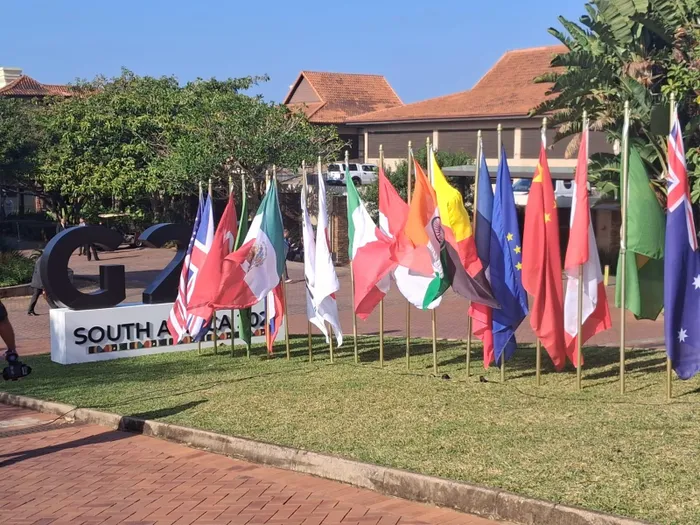G20 Finance Track meetings highlight global economic challenges

Key note addresses from Minister of Finance, Enoch Godongwana, Dr Duncan Pieterse, Director-General of the National Treasury, and Lesetja Kganyago, the governor of the South African Reserve Bank highlighted the global uncertainty and challenges faced by developing and African countries.
Image: Yogashen Pillay
The G20 Finance Track meetings that took place in Zimbali North of Durban entered its final day on Friday.
Key note addresses from Minister of Finance, Enoch Godongwana, Dr Duncan Pieterse, Director-General of the National Treasury, and Lesetja Kganyago, the governor of the South African Reserve Bank highlighted the global uncertainty and challenges faced by developing and African countries.
Pieterse on the opening day of the G20 Finance Track meetings said that we are meeting at a moment of ongoing uncertainty in the global economy.
“While there are signs of resilience in some areas, various challenges remain: uneven growth trajectories, elevated debt levels, persistent inflationary pressures, and the complex implications of tightening financial conditions.”
Pieterse added that at the same time, various long-term transitions including digitalisation, climate finance and demographic shifts are reshaping the foundations of our economies.
“The multilateral system is being tested, and our collective ability to respond, will shape the pace of our recovery, but also the prospects for inclusive and sustainable development."
“‘As the G20, we have the responsibility to demonstrate leadership, and our Presidency places a very strong emphasis on strengthening the role of the G20 in delivering concrete solutions, fostering a more stable and effective and resilient international financial architecture, enhancing debt sustainability, addressing liquidity challenges, as well as strengthening multilateral development banks, and ensuring financing for development,” added Pieterse.
Godongwana in his opening remarks at the Finance Ministers & Central Bank Governors (FMCBG) Meeting said that we meet at a time of fragile global economic growth. “While inflation is gradually moderating and financial conditions have started to stabilise in some regions, uncertainty continues to weigh heavily on global growth prospects. Rising trade barriers, persistent global imbalances and new geopolitical risks are significant concerns.”
Godongwana added that many developing countries, especially in Africa, remain burdened by high and rising debt vulnerabilities, constrained fiscal space, and a high cost of capital that limits their ability to invest in their people and their futures.
“Technological shifts—especially in artificial intelligence and digital finance—offer tremendous potential but also demand robust governance and coordinated action to harness the opportunities, mitigate risks such as job displacement, and bridge the digital divide towards inclusive growth. At the same time, climate-related shocks and extreme weather events are increasing in frequency and severity worldwide, impacting lives, livelihoods, and macroeconomic stability,” said Godongwana.
Godongwana added that in the face of these complex challenges, the G20 must remain a source of strategic global leadership, cooperation, and action. “We must extend our efforts, if we are to reach our true potential as a collective, to enable us to deal decisively with the economic, environmental, developmental and social challenges that plague especially Africa, low-income countries in other regions and small developing states.”
Kganyago warned of the headwinds for the global economy as forecasts have been revised lower.
“Risks to the outlook have been tilted to the downside, while inflation has eased across countries, it remains higher than desired. Central banks have to skillfully navigate what uncertainty means for their financial stability mandates,” Kganyago said.
“These developments are unfolding under the backdrop of elevated debt and emerging risks on financial sustainability. According to the Organisation for Economic Co-operation and Development (OECD), the world has shifted to a new debt paradigm. Governments and companies are borrowing more than $10 trillion (R179 trillion) compared to the pre-COVID-19 period.”
Meanwhile, Greenpeace Africa has called on G20 host and South African President Ramaphosa to push ahead on accelerating efforts to impose a wealth tax on the world’s billionaires and to support the UN Tax Convention for new and fair global tax rules.
Cynthia Moyo, Lead Campaigner, Greenpeace Africa, said that it’s outrageous that billionaires keep getting richer from a broken global tax system while millions across Africa and the world are driven deeper into poverty and climate chaos.
BUSINESS REPORT